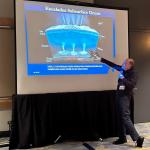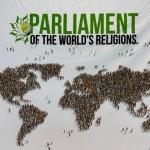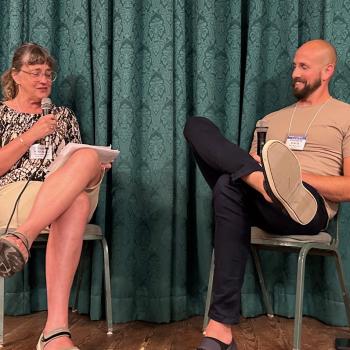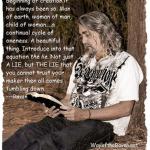Planetary Hugs

These are good people here. Well, even if they are simul justus et peccator (or even just peccator), they embrace good things. World peace and economic justice top the list of goods embraced. Planetary sustainability, a healthy diet, women’s rights, non-violence, animal welfare, intersectional dignity, and deep breaths are drawn to everyone’s bosom and felt in the heart. “Planetary Hugs” is the term that comes to my mind.
Planetary Hugs and the Global Ethic
I’ve followed some of the Global Ethic sessions. I find the foundational assumptions here a bit odd. The Global Ethic…
…is a unique and courageous expression of the moral values and principles shared by people throughout the world, whether religious or not…It is a powerful starting place for collaboration between those whose beliefs or worldviews may clash but who agree on the basic moral principles and values that ground their work on issues of common concern. (Program Booklet)
This sounds like a democratic approach to values. Whatever is already valued becomes the norm. I’d prefer my norm to be philosophically or even theologically grounded rather than subject to principles already shared, especially those principles shared by the petroleum industry or strongman tyrannies. But, let me button my lip. For a half century now it has been my planetary hug to proffer a vision of a single society that is just, participatory, sunstainable, and planetary. So, I feel at home with the planetary hugs of the Parliament.
The Global Ethic Declaration of 1993
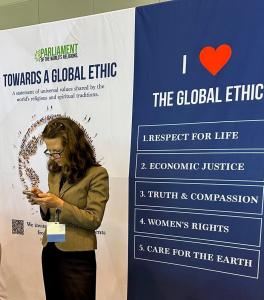
The Parliament has been at this since 1993, when it published its Global Ethic Declaration. The declaration begins with a strong statement of need.
The Global Ethic responds to an urgent practical need as well as a deep spiritual hunger for clear moral guidance on the most fundamental issues of human life and conduct. It expresses a minimal set of principles for committed action in a world torn by violence, religious and racial hatred, oppression of women and minority groups, extremes of wealth and poverty, and the growing threat of climate change and destruction of the natural world. A major achievement of the Global Ethic is to demonstrate that there is agreement on these issues. It recognizes that beyond legislated laws and conventions there must be changes in people’s minds, hearts, and ways of life.
I appreciate particularly Directive 5: you shall not be greedy. Or, to put it another way, “Commitment to a Culture of Sustainability and Care for the Earth.”
Specifically, one session I attended began by envisioning the planetary society of the future. It has been my contention for half a century that a global ethic begins with a vision of how integrated life should be and is then followed by appropriate action. “Think globally and act locally,” was the slogan for the 1979 World Future Society. So, I was gratified when walking into this session.
But, then I got disappointed. Projecting a vision consisted only of visionary meditation. Where’s the science? Where is the technology? In 1972 the Club of Rome told us how to employ computer projections–population growth, natural resource depletion, agricultural production, industrial production, and pollution production–as data to determine specific global policies. But, alas, all we get at the Parliament is meditation. Planetary hugs? Great. But no growth in sophistication in 50 years. Yuck.
Planetary Hugs in the Earth Charter
The Earth Charter of the year 2000 similarly recognizes our global connectedness and the urgency of planetary hugs. “Humanity is part of a vast evolving universe. Earth, our home, is alive with a unique community of life.” Within the Earth Charter’s game plan is employment of science and technology. “Promote development, adoption, and equitable transfer of sound technologies.” Hooray!
Science and Religion Track at the Parliament
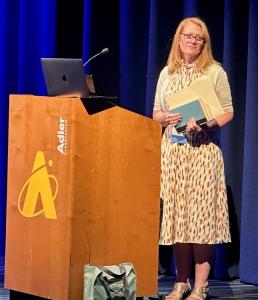
When I attend sessions within the Science and Religion track sponsored by IRAS (Institute on Religion In an Age of Science), we hear actual data regarding food production and prospects of developing increased aquaculture. Ah. My sanity has returned.
More. Like the Earth Charter, the scientists at the Parliament remind us that Planet Earth is contextualized in the solar system, which is contextualized in the Milky Way, which in turn belongs to an immense cosmos. Planetary hugs become cosmic hugs.
Conclusion
I’m heartend by the overflow of heartfelt commitment to future generations who will live in the biosphere now being robbed of its fecundity by the present generations. And I’m heartened that persons in such a wide variety of religious traditions are of one mind regarding the urgency for global repentance, metanoia, and transformation. I’m joining in the planetary hugs.
Yet, what we need are practical strategies deriving from scientific visions of just what needs to be done in order to heal what is broken in the human relationship with the biosphere.
For more, try these.
Ecotheology when “It’s Time to Act”
Just, Sustainable, Participatory, and Planetary. Common Good Part Five
2023 Parliament of the World’s Religions: How Big is God?
2023 Parliament of the World’s Religions: Ultimate Unity
2023 Parliament of the World’s Religions: Planetary Hugs
▓
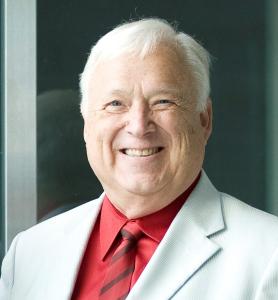
Ted Peters is Distinguished Research Professor Emeritus of Symstematic Theology and Ethics at Pacific Lutheran Theological Seminary and the Graduate Theological Union. Along with Robert John Russell he co-edits the journal, Theology and Science, published by CTNS. He is author of Playing God? Genetic Determinism and Human Freedom (Routledge, 2nd ed., 2002) plus a single volume systematic theology, God—The World’s Future (Fortress, 3rd ed., 2015). Along with evolutionary virologist Martinez Hewlett, he has co-authored three books on the evolution controversy. Peters’ edited and co-edited books such as AI and IA: Utopia or Extinction? (ATF 2019) and The CRISPR Revolution (forthcoming Praeger 2023) explore technological and ethical scenarios that alert us to the need for public policy formulation before matters get out of hand. Ted has just published a new book, The Voice of Public Theology, with ATF (2023). Visit his website, TedsTimelyTake.com and his Patheos blog site on Public Theology.
▓



